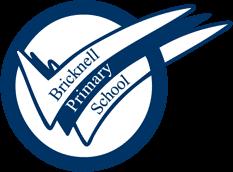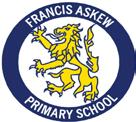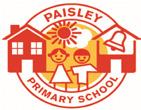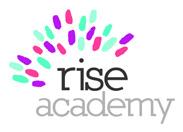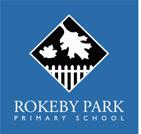WE SHINE BRIGHTER TOGETHER

Strategic Plan
2023 - 2024


2023 - 2024
A ‘child centred’ Trust where forward thinking, like minded Academies work together to achieve the best opportunities and outcomes for our young people.
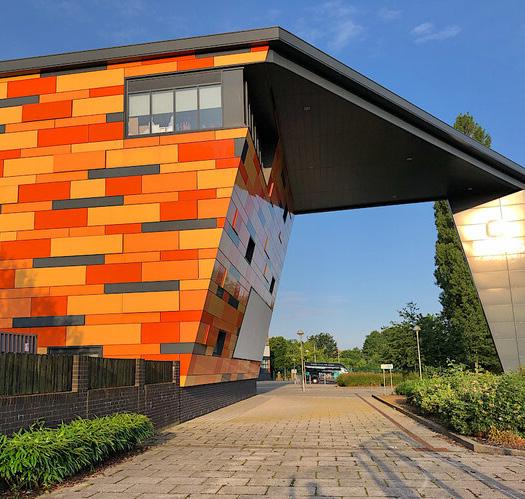
Our goal is to provide the best education for all children taught in our Trust, share great practice and ideas to the benefit of all.

1. All pupils, regardless of starting point, will meet their full potential
2. All schools will offer a broad, exciting and engaging curriculum that creates a love of lifelong learning
3. Every pupil will be given opportunities to develop socially and emotionally to become confident, resilient learners
4. The achievement gap between disadvantaged and non-disadvantaged pupils will be closed
5. Recruit and retain excellent staff providing high quality professional development
6. Best value will be achieved through robust, centralised services to benefit all
All pupils will meet their personal potential
Achieve best value
The Super 6 for Success
Recruit and retain excellent staff & provide quality CPD
The attainment gap will be closed
All schools will offer a broad, exciting and engaging curriculum
All pupils will be given opportunities to develop socially & emotionally to become resilient
To develop the Constellation Trust to maximise the benefits for all pupils who attend our schools
To develop the Constellation Trust’s Strategy to continue to provide effective school improvement
Develop the SEND provision
Improve parental engagement
Improve Attendance and reduce persistent absence
Improve Outcomes at KS1 - 5
Improve behaviour to reduce suspensions and permanent exclusions
Reduce the need for AP places
Financial management to maintain some reserves
Introduce & embed Team around the school
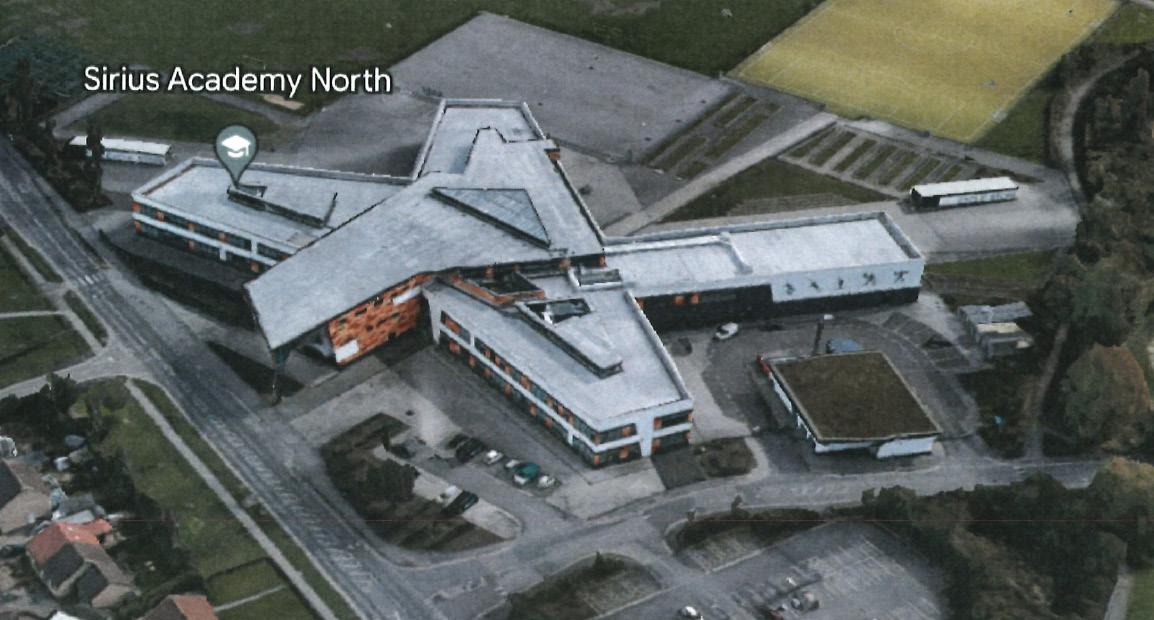

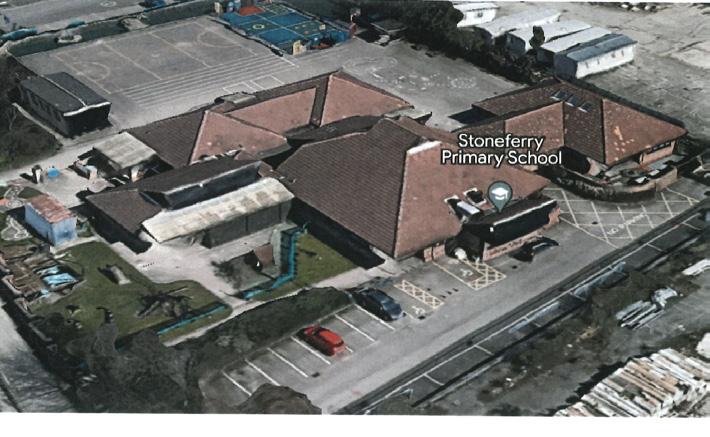
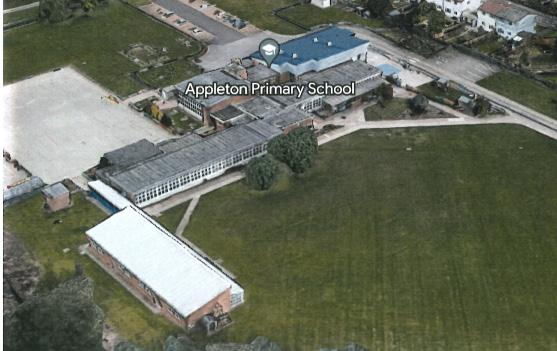
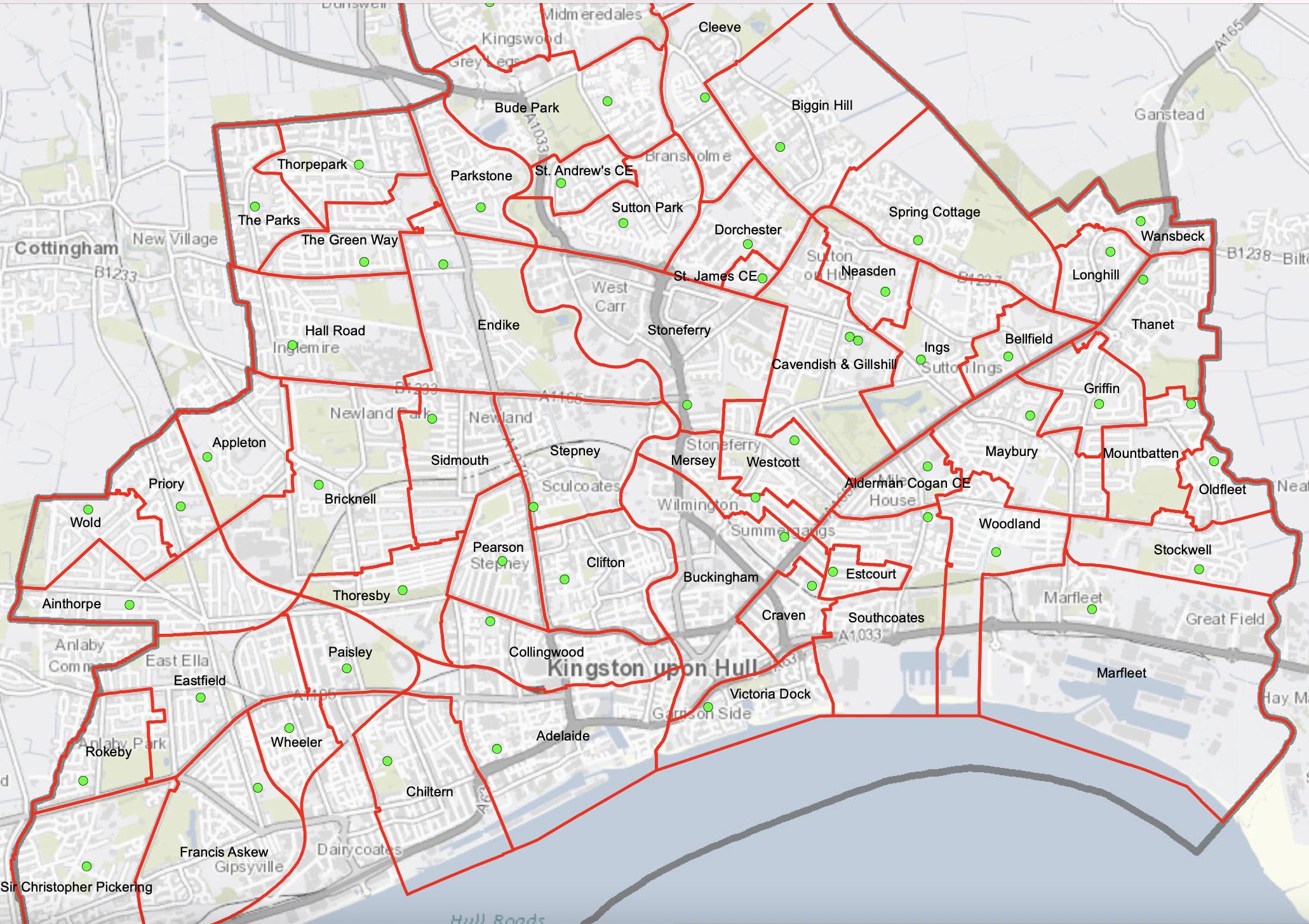
Rise main Site – KS4 and vocational offer Rise Academy including – Rising Stars (MLD provision at Bricknell Children’s Centre) Rise Up & Rise Together – KS3 offer
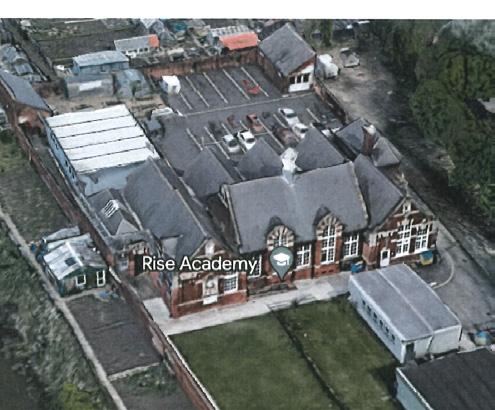

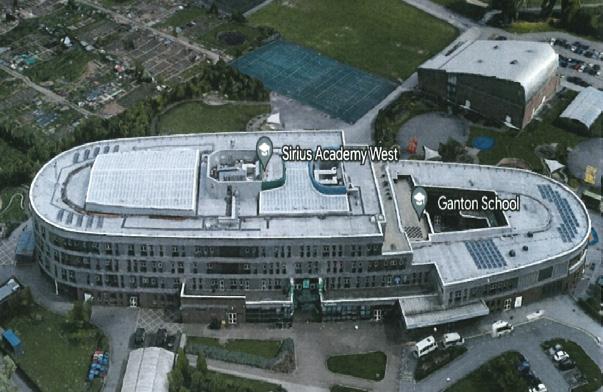
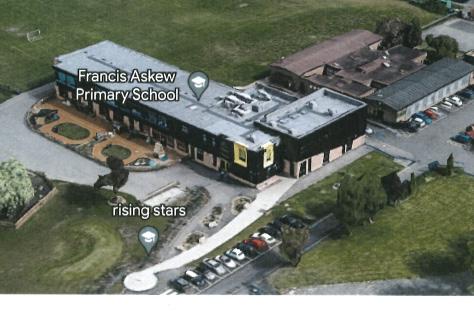

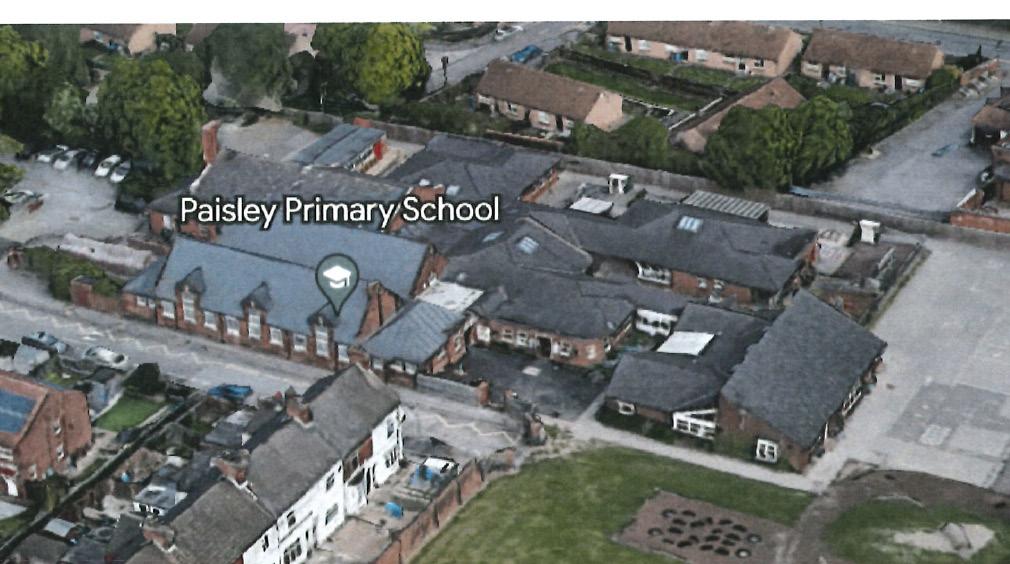

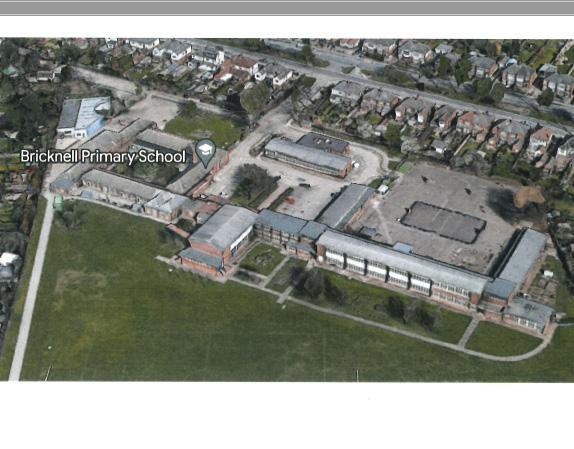
Bricknell autism unit
Victoria Dock additional needs hub
Sirius Academy North additional needs hub
Step out provision for Years 7 and 8
Pupils who struggle to self-regulate are accessed
Transition support provided in-school through pathway system
Review and re-evaluate provision
Transition back to mainstream school
12 weeks Step Out provision
Assessment for alternative provision
Trust Alternative Provision – Francis Askew Site (Currently Rising Stars) ‘Bright Stars’
Additional staff across site: 1 site lead/project leader and 1 additional needs practitioner
Circuit breaker
Cohort – 5 places available immediately as per the places available, 5 day stays per student
Staffing – 2 members of support staff
Purpose – continuation of curriculum learning and reflection/restorative work to prepare students to reintegrate back into the mainstream school following the five days – eg. Fishbowling, sensory breaks, etc.
Curriculum model – work provided from the mainstream school for students to complete independently.
Assessment Centre
Cohort – 5 places available for the length of time required per student.
Staffing – 1 teacher and 1 teaching assistant.
Purpose – for students who need to be assessed for plans – eg. those who have attended Whitehouse for considerable amounts of time.
Curriculum model – Close to the current Rising Stars and Rise Up nurture group curriculum, adapted depending on student need.

Step Out Provision
Cohort – 10 places available for 12 weeks including initial assessment (whilst still in mainstream) and transition back to mainstream.
Staffing – 2 teachers and 2 teaching assistants.
Purpose – a time limited provision to enable year 7 and 8 students to stay in mainstream by offering early, targeted support.
Curriculum model – Aligned with the curriculum for the Step Out model commissioned by Hull CC.
1 week
Assessment in mainstream, begin work with families and students
9 weeks
Students fully educated at Bright Stars site following curriculum of English, maths, science and RSHE alongside a wellbeing curriculum. All aspects of the curriculum focus around the Step Out values of: Hard Work, Resilience, Kindness and Pride (TBC). E.g. Sporting projects focus on digging deep even when things are hard and working together as a team to achieve more.)
2 weeks
Personalised transition back into schools, values based assessment task and written reports for each student with recommendations for schools, graduation ceremony.
Birch (Music VDock)


Education is the passport to the future, for tomorrow belongs to those who prepare for it today.
Malcolm X
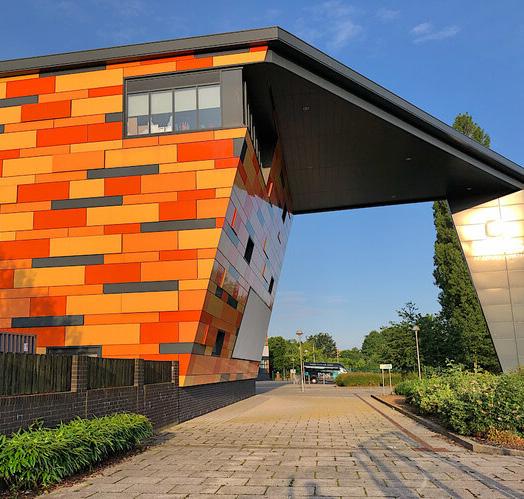
The only person who is educated is the one who has learned how to learn ...and change.
Carl Rogers
To develop the Constellation Trust to maximise the benefits for all pupils who attend our schools
1. To review the staffing structures to address the recommendations from the DfE financial management review and provide parity within the Trust
Responsible staff: C. Taylor with L. Richardson, R. Kennington, T. Attwater & Heads of School
Commentary
2. To complete a trust wide tender process for the following services:
• Photocopying
• HR and payroll
• Supply staff
Responsible staff: T. Taylor with R. Kennington & A. Barkworth
Commentary
3. To introduce and embed Multi Factor Authorisation (MFA) across the trust IT systems
Responsible staff: T. Taylor with RM
Autumn Term 2023
Evidence in Term 1 (subject to Board approval in the summer term 2023)
Autumn Term 2023
Autumn Term 1 - 2023
Commentary
4. To embed the use of Every software to support HR systems
Responsible staff: L. Richardson with HR Team
Autumn Term 1 - 2023
Commentary
5. To develop a long-term plan for the Trust’s estate including the necessary large-scale maintenance work
Responsible staff: V. Hone, T. Taylor, R. Kennington & C. Taylor
Commentary
6. To consider the long-term solution to ensure the Trust schools are equipped with appropriate IT and continue the process of network refresh
Responsible staff: T. Taylor, R. Kennington & C. Taylor
Commentary
7. To develop a strategy for talent management and succession planning to recruit and retain the best staff within the Trust
Responsible staff: T. Attwater
Commentary
Autumn Term 1 - 2023
8. To develop the Trust’s use of alternative provision that includes a staged approach to specialist support
Responsible staff: P. Mountain-Wade, C. Taylor, I. Ravenscroft & G. Ransom
Commentary
9. To review the scheme of delegation and the role of the Local Advisory Board in school improvement
Responsible staff: C. Taylor with R. Kennington & Trustees
Autumn Term 1 - 2023
Commentary
10. To explore opportunities for the growth of the Trust subjects to detailed due diligence
Responsible staff: C. Taylor with R. Kennington, T. Attwater, T. Taylor & V. Hone
Commentary
11. Plan the opening of a free school with a specialism in AP in September 2024 subject to a successful application to the DfE in partnership with the East Riding Council
Responsible staff: P. Mountain-Wade with C. Taylor, L. Richardson, R. Kennington, T. Taylor, V. Hone
Commentary
Autumn Term 1 - 2023
Autumn Term 1 - 2023
1. To review the effectiveness of school improvement in terms of the needs of each school and the expertise of the team
Responsible staff: C. Taylor with R. Kennington, T. Attwater, & L. Richardson
Commentary
2. To set each school specific KPIs (set in the schools’ plans) linked to Heads of School PMR targets
Responsible staff: C. Taylor with T. Attwater
Commentary
3. To develop a trust approach from KS1-KS4 to address the small but significant number of pupils who are unable to self-regulate their behaviour
Responsible staff: C. Taylor with T. Attwater, P. Mountain-Wade, I. Ravenscroft & H. Stannard
Commentary
4. To develop the provision within the trust for pupils with additional needs
Responsible staff: P. Mountain-Wade with C. Taylor, T. Attwater, I. Ravenscroft, H. Stannard, Lyndsey Reed, A. Saunders
Commentary
Autumn Term 2023
Autumn Term 2023
Autumn Term 1 - 2023
Objective Progress
5. To evaluate the role and impact of Yorkshire & Humber Teacher Training and Blue Print Alliance
Responsible staff: C. Taylor with R. Kennington & C. Fletcher
Autumn Term 1 - 2023
Commentary
Objective Progress
6. To recruit two additional members to the Trust Board
Responsible staff: C. Taylor with R. Kennington & Trustees
Autumn Term 1 - 2023
Commentary
1. To improve outcomes and the progress of pupils in KS1 and KS2
Success Criteria
Pupils to achieve the national average or above at ARE+ in the KS2 SATS in 2024
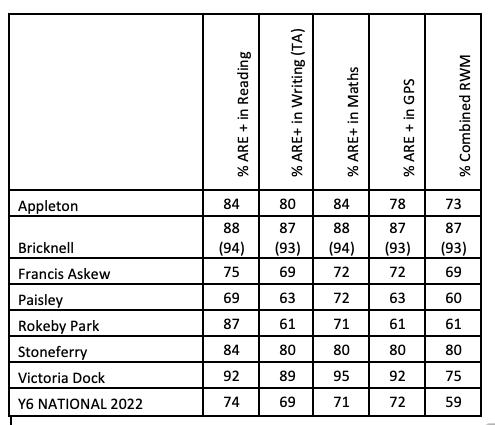
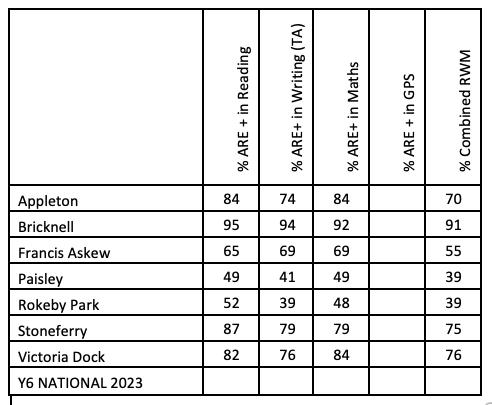
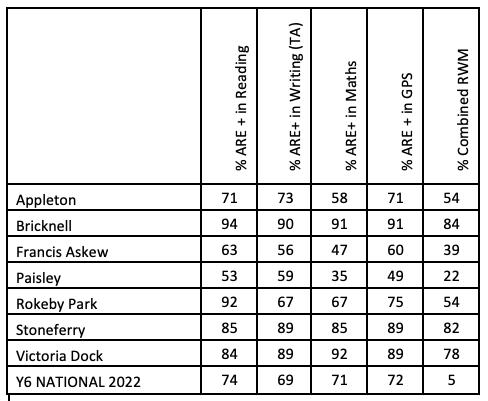
Historical Data for 2022
Evidence from Data
Internal Data for Mid-Year – February 2023
Targets for ARE+ in 2023
Pupils to achieve the national average or above at GD in the KS2 SATS in 2024


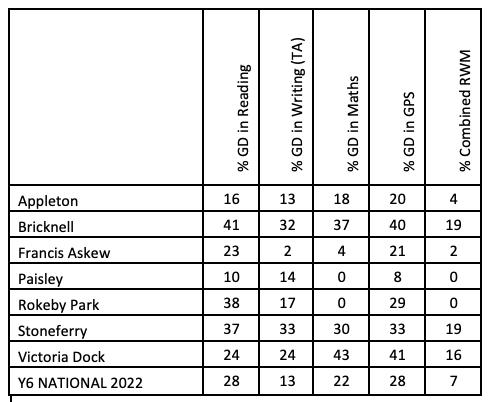
Internal Data for Mid-Year – February 2023
Targets for GD in 2023
Pupils to achieve the national average or above at ARE in the KS1 SATS in 2024
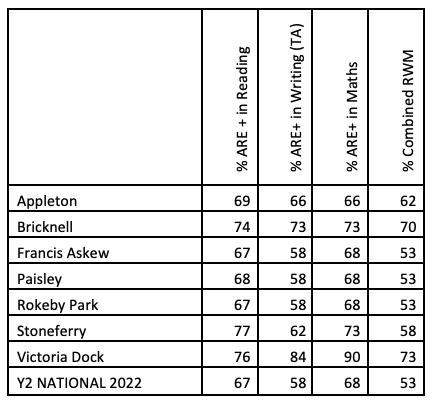
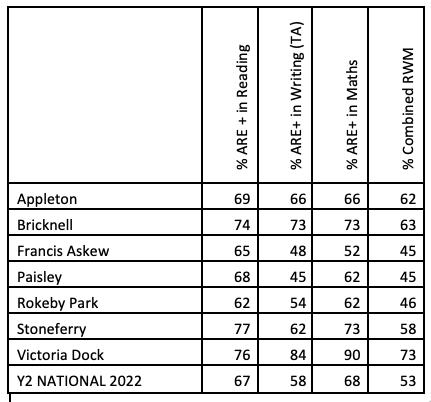

Historical Data for 2022
Internal Data for Mid-Year – February 2023
Targets for ARE+ in KS1
Pupils to achieve the national average or above at GD in the KS1 SATS in 2024
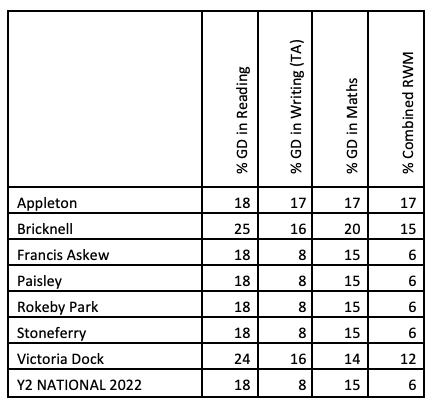
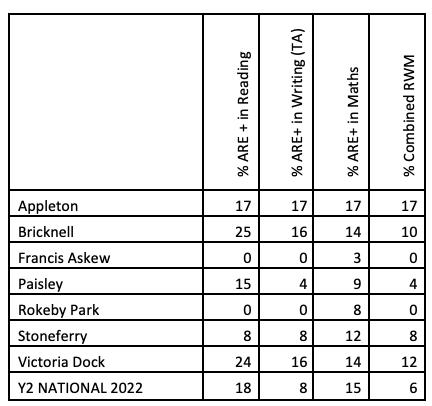
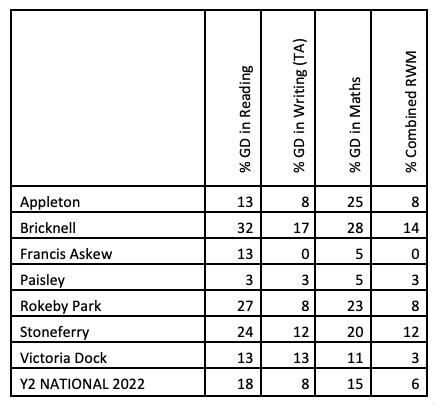
Internal Data for Mid-Year – February 2023
Targets for GD in KS1
Pupils to achieve the national average or above phonics screening check

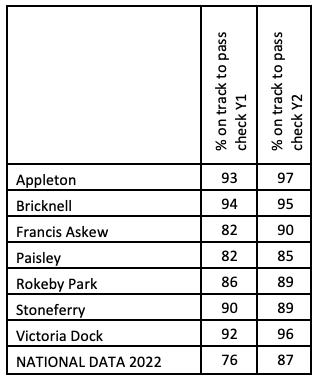
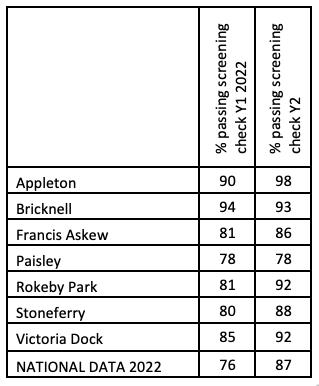
Historical Data 2022
On track to pass screening check: Mid-Year data 23
Targets 23
Pupils to achieve the national average or above in EYFS
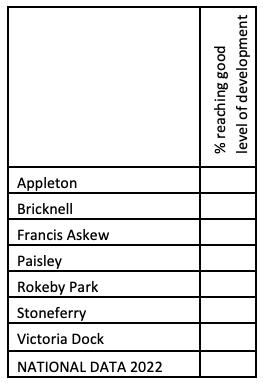

Historic data 2022
Targets
Mid-Year data 23
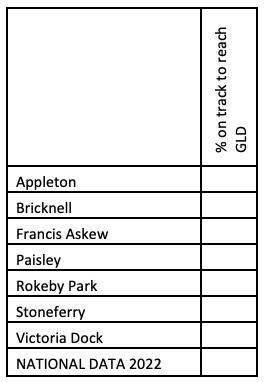
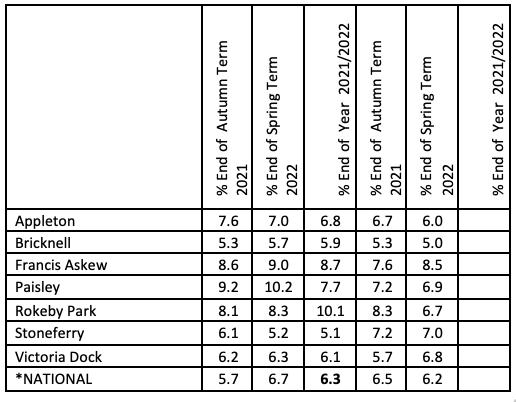
To improve attendance of pupils
Autumn Term 1 - 2023

*Data sources: 21/22 Statistics: pupil attendance and absence - GOV.UK (www.gov.uk) 22/23 (explore-education-statistics.service.gov.uk) until release Nat Stats
It should be noted that trying to make like for like yearly comparisons, to previous National data, isn’t possible due to the legacy of Covid lockdowns, the change in the way that school data was collected at a national level and the introduction of new service ‘explore education statistics. “The figures are published as experimental official statistics to give an indicative figure for the absence rate……..They should be viewed as an early indicator for the more detailed but less regular National Statistics on pupil absence (which will include school level breakdowns).”
To reduce the number of pupils who are persistent absentees
Autumn Term 1 - 2023
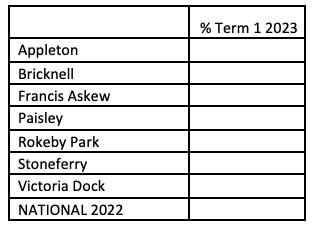
*Data sources: Pupil absence in schools in England, Academic year 2021/22 – Explore education statistics – GOV.UK (explore-education-statistics.service.gov.uk)

Comment
As above
Reduce the number of pupils suspended
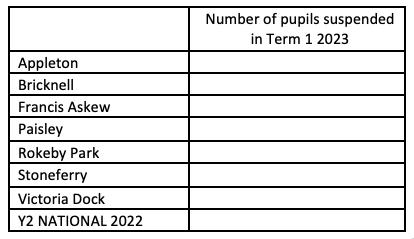
the academy’s ethos
Autumn Term 1 - 2023
Comment

Success Criteria
40% of pupils to achieve a grade 5 or above in GCSE English & maths in 2024
Evidence from Data
Autumn Term 1 – 2023
Commentary
• 2022 saw our highest level of attainment across subject and Academy and subject measures, with the exception of MFL and IT & Business subjects.
• The predictions show that this trend is set to continue in 2023.
• This is despite a fall in attainment on entry as well as disruption due to the pandemic
Success Criteria
60% of pupils to achieve a grade 4 or above in GCSE English & maths




Autumn Term 1 – 2023
Evidence from Data
Commentary
• This trend in 4+ crossover (and across subjects) is upwards.
• Due to the level of EAL migration and attainment on entry 4+ is problematic due to the number of students who need to be supported at a lower level e.g. to learn English.
Success Criteria
12% of pupils to achieve the EBacc at 5+
Evidence from Data
Autumn Term 1 – 2023
Commentary
• Despite the increases between 2019 and 2022, the results in MFL are the current limiting factor in the growth of EBACC results. This is reflected in current projections in 5+
• The Academy is consistently around national average for EBACC entry

Success Criteria
40% of Pupil Premium pupils to achieve a grade 5 or above in GCSE English & maths



Evidence from Data
Autumn Term 1 – 2023
Commentary
• The gap between PP and their peers remains stubborn despite an increase in the percentage achieving 5+ crossover between 2019 and 2022.
• The level of PP at the Academy is increasing from a high baseline.
Success Criteria
60% of Pupil Premium pupils to achieve a grade 4 or above in GCSE English & maths


Autumn Term 1 - 2023
Commentary
• The gap between PP and their peers remains stubborn despite an increase in the percentage achieving 4+ crossover between 2019 and 2022.
Success Criteria
25% of Pupil Premium pupils to achieve the EBacc
Autumn Term 1 - 2023

Commentary
• As per general EBACC performance, MFL is currently the limiting factor for EBACC increases. While there was an increase between 2019 and 2022, this is not projected to continue in 2023.

0% of pupils with Low Prior Attainment (LA) to achieve a grade 5 or above in GCSE English & maths (via FFT 20)




Autumn Term 1 - 2023
Commentary
• Despite FFT 20 consistently predicting 0% at 5+ (or 4+) LA students do achieve crossover at 5+. Historically, the Academy as performed well with LA students.
0% of pupils with Low Prior Attainment (LA) to achieve a grade 4 or above in GCSE English & maths (via FFT 20)
Autumn Term 1 - 2023
Commentary
• Despite FFT 20 consistently predicting 0% at 4+ LA students do achieve crossover at 5+. Historically, the Academy as performed well with LA students.
• Currently, nearly 1 in 5 lower prior attaining students are projected to achieve crossover at 4+, a growing trend.
0% of pupils with Low Prior Attainment to achieve the EBacc (via FFT 20)
Autumn Term 1 – 2023

Commentary
• Though options are available to all, the lower take up of MFL for lower prior attaining students means that the results are based upon low numbers.
96% of High Prior Attainment (HA) pupils to achieve a grade 5 or above in GCSE English & maths (via FFT 20)



Autumn Term 1 - 2023
Commentary
• Historically, the Academy have performed comparatively less well with higher prior attaining students
• However, the low numbers of HA students reduce the statistical significance. (There were 36 in 2022)
• The trend is upwards between 2019 and 2022, however, there remains work to do in 2023.
96% of High Prior Attainment (HA) pupils to achieve the EBacc (via FFT 20)


Autumn Term 1 – 2023
Commentary
• There was a rapid increase in those achieving EBACC amongst higher attaining students between 2019 and 2022.
• This is projected to stabilise in 2023.

Success Criteria
To improve attendance of pupils from 87% in 2022/2023 to 93%* or more in 2023/2024


Evidence from Data
Autumn Term 1 - 2023
Commentary
• Attendance has not returned to pre-pandemic levels and remains a significant challenge
• Despite the overall figures, we are confident that all measures are being taken and peer networks used to constantly review the effectiveness of attendance strategy.
Success Criteria
To reduce the number of pupils who are persistent absentees

Autumn Term 1 – 2023
Evidence from Data
Commentary
• The overall attendance issue is compounded by the increased levels of severe persistent absence.
• Like attendance, persistent absenteeism has not returned to the national average, pre-pandemic levels
Reduce the number of pupils suspended from the academy Autumn Term 1 - 2023
Evidence from Data
Commentary
• Fixed-term suspension are high, though permanent exclusions are low.
• Changes in approach to address key areas such as verbal abuse and persistent defiance have resulted in higher suspension though this is now beginning to fall.
• Despite increasing suspensions, the average length of suspension is falling, therefore there is less time with disrupted learning.
• Beyond, persistent defiance, suspensions for higher order incidents such as violent incidents continue to fall.
Success Criteria
Reduce the number of pupils who have repeated suspensions from the academy, Autumn Term 1 – 2023




Evidence from Data
Commentary
• The number of students suspended is also high, though case study evidence shows how individuals are supported to reduce suspensions through individual support and Academy pathways
• The high number of suspensions, are a combination of high expectations as well as the high level of challenge within the context of the Academy. For example, students may join the Academy and initially struggle due to a history of challenging behaviour, however they are supported to reduce suspensions over time.
• Often, multiple suspensions may happen over a short space of time with Academy strategies reducing suspensions over time.
Reduce the number of pupils who are dual registered in AP at Rise Academy from 55 in 2022/2023 to <30 in 2023/2024


Pupils dual registered at Rise Academy (Current-Term 3)
Autumn Term 1 – 2023
Evidence from Data
Pupils dual registered at Rise Academy
Commentary
• From a high of 77, the use of AP is gradually reducing due to the implementation f An Academy pathway system.
• AP use is projected to reduce at an increased rate form 23/24
• The use of AP is based upon the best pathway to support each student so reductions are based upon the ability to recreate provisions within the Academy.
Streamline the entry and exit process to internal support programmes including Sapphire, Diamond and Emerald pathways and provide evidence of the impact of the discrete pathway by providing numbers of pupils in each.


Summer term 2023
Evidence from Data
Data for September 2023
Commentary
• The Academy pathway system is supporting students to remain in mainstream as well as reducing time out through suspensions
• The pathways have supported an overall increase in Academy climate as well as case study evidence highlighting the impact on individual students.
• As per whole Academy, attendance remains the greatest challenge of the pathways.
Success Criteria
40% of pupils to achieve a grade 5 or above in GCSE English & maths in 2024 Autumn Term 1 – 2023

Evidence from Data
Commentary
A high ability programme is now in place to inspire students to aspire to reach the top grades. Historical issues of students ‘settling’ for lower grades based on college entrance criteria has seen a trend in limited students sustaining motivation to strive beyond this. Implementation of the curriculum Is being strengthened in English and Maths with weaker teachers moving on, there is however an increase of inexperience within both teams.
Success Criteria
60% of pupils to achieve a grade 4 or above in GCSE English & maths in 2024 Autumn Term 1 - 2023



Evidence from Data
Commentary
A reduction of students accessing alternative provision and increasing attendance will directly impact the attainment levels in English and Maths. An effective KS3 curriculum and strong implementation will ensure a solid foundation in knowledge is in place for an effective KS4. Strong subject knowledge supported by regular CPD is in place to ensure those teachers needing support have access to it including any non-specialists and ECTs.
An effective reading catch-up strategy is now in place in KS3 to support the weakest readers develop in line with their peers and age expectations. Securing students ability in reading and comprehension in KS3 is key to unlocking success in KS4 and enabling us to increase class sizes in years 8 and 9 reducing staffing costs. The academy has an effective SENDCO in place to ensure curriculums are adapted to meet learners’ needs and barriers are removed.
Success Criteria
15% of pupils to achieve the EBacc in 2024
Autumn Term 1 - 2023
Evidence from Data
Commentary
During the options process (current Year 9) we have worked with the higher ability cohort to maximise the uptake of EBACC with this group by selling the ‘Aspiration’ package. For other cohorts we have tried to maximise the uptake of MFL by removal of the option to take both history and geography and create a push to take the language, though we are not mandating this. We have allowed students to complete an FCSE qualification in year 9 which is allowing them to see success in this challenging subject and drive their ambition to continue with this into KS4. We have also marketed the trips that students are encouraged to attend at KS4 when they study a language and have worked on the curriculum to ensure that it is implemented with an effective and engaging pedagogy via the Franco Conti methods.


Success Criteria
30% of Pupil Premium pupils to achieve a grade 5 or above in GCSE English & maths Autumn Term 1 - 2023


Evidence from Data
Commentary
A strong character and personal development programme are embedded in the academy providing students with opportunities they may not otherwise have. Building our most deprived students’ cultural awareness will raise aspiration and support growth in the core subject areas. Barriers in place from deprivation are removed where possible including providing student with laptops, access to the internet, revision guides, revision material along with extracurricular trips, visits and external learning opportunities to compliment the curriculum content and learning.
Success Criteria
55% of Pupil Premium pupils to achieve a grade 4 or above in GCSE English & maths

Autumn Term 1 - 2023
Evidence from Data
Commentary
Success Criteria
7% of Pupil Premium pupils to achieve the EBacc in 2024
Autumn Term 1 - 2023
Evidence from Data
Commentary
Entry numbers are restricted with courses already started for examination in 2024. Plans have been refined to increase EBACC entries moving forward.




Success Criteria
2% of pupils with Low Prior Attainment (LA) to achieve a grade 5 or above in GCSE English & maths


Evidence from Data
Autumn Term 1 - 2023
Commentary
Success Criteria
15% of pupils with Low Prior Attainment (LA) to achieve a grade 4 or above in GCSE English & maths


Evidence from Data
Autumn Term 1 - 2023
Commentary
Success Criteria
2% of pupils with Low Prior Attainment to achieve the EBacc



Autumn Term 1 - 2023
Evidence from Data
Commentary
The options process in (current year 9) is no longer limited for low attainers. All students study a language and a humanities subject throughout the whole of KS3 and have opportunity to continue this into KS4. However, students’ needs, and parental wishes often see LA students studying more appropriate courses in KS3 like, independent travel and life skills. Whilst some LA pupils continue to study a humanities they may not be entered for the GCSE qualification.
Success Criteria
85% of High Prior Attainment (HA) pupils to achieve a grade 5 or above in GCSE

English & maths


Evidence from Data
Autumn Term 1 - 2023
Commentary
A strong Post 16 provision and a dedicated AHT to raising attainment of the HA pupils supports the efforts in increasing aspiration.
Success Criteria
8% of High Prior Attainment (HA) pupils to achieve the EBacc
Autumn Term 1 - 2023
Evidence from Data
Commentary
A refined option process this year has ensured more HA pupils have access to an EBACC curriculum. Students will now study less qualifications and have increased curriculum time across the EBACC subjects.

The MFL curriculum is now solely implemented by specialists and an embedded collaborative planning strategy in humanities mitigates for non-specialist teaching in KS3 which has historically led to weaker foundations in learning when students have started humanities courses in KS4.
A strong careers programme is embedded and is developing to ensure more aspirational options are shown to HA students from KS3.
40% of entries at an average grade of B+; a positive value-added score (0.2 –) Autumn Term
** In 2109 we ran a double sport course (2 equivalent A Level grades) and a triple HSC course (3 equivalent A Level grades) so these data are skewed accordingly.



Those data listed above are subject to the following explanatory notes:

- There is a tendency to overpredict, the variance of last-progress cycle prediction to actual results in the summer lies at around 10% average annually. In short, one would expect between 5-10% drop in performance at each iterative grade point (indicative results for 2023).
- A value-added measure is a more accurate mechanism to discern Sixth Form Progress, with the enhanced academic profile of our students, the outcomes in 2022 look like a substantial improvement (and there are elements of this). However, it would still be likely to return a negative value-added score, as they did (negligibly) in 2019.
- The attainment outcome would likely lie at between C+ and B- on current performance. The value-added score, with the data above, would render a positive outcome.
- The only Applied General subject we offer is Criminology. This performs well and has done so since we made the decision to run it in 2020. The absence of results in 2019 reflects this.
- Vocational subjects continue to perform well, the offer of additional vocational subjects to improve outcomes generally is being considered. On that note, it must be stated that in 2109 we ran a double sport course (2 equivalent A Level grades) and a triple HSC course (3 equivalent A Level grades) so these data are skewed accordingly.
The Supporting Data for the predictions above can be found in the latest progress cycle (March 2023). These have been adapted to take account of overprediction, when holistically compared to previous years’ data.




To improve attendance of pupils from 91.19% in 2022/2023 to 93% or more in 2023/2024

Evidence from Data
Autumn Term 1 - 2023
Attendance remains a whole school priority. An investment from the academy into improving attendance has been made with the addition of an engagement officer into the attendance team. The academy remains above national and local averages based on information from the DFE, however much work remains to be done to reach pre covid levels.
To reduce the number of pupils who are persistent absentees from 28.4% in 2022/2023 to 26% or less in 2023/2024


Evidence from Data
Autumn Term 1 - 2023
Reduce the number of pupils suspended from the academy Autumn Term 1 - 2023
Behaviour and Attitudes received RI in the latest Ofsted report. Much work has been done to ensure behaviours and routines for students are refined, simplified and rewarded when positive. Consistency in staffing remains a priority. Expectations have been heightened in the last 12 months with the non-completion of extended learning/ homework being recorded which has increased behaviour data. The academy’s lesson one programme supports the students’ ability to self-regulate and reflect with the PSHE, character development and personal development curriculums all delivered in this time.
Reduce the number of pupils who have repeated suspensions from the academy Autumn Term 1 - 2023



Evidence from Data
A range of support is in place for students struggling to adhere to the Academy’s expectations. The academy has many trained ELSAs offering support as well as a MHSP and a school nurse on site. The Academy’s multi layered approach to supporting students with SEMH is bespoke with interventions including external agencies like Corner House.
The Academy works alongside many outside agencies when supporting our most challenging students including Tiger’s Trust and KIDS. Our Diamond pathway provides students with a bespoke support package with a high staff: student ratio in an attempt to re integrate students back into our mainstream provision.
Many positive relationships with other Hull schools are in place enabling us to offer manage moves to students who have been repeatedly suspended from the academy. This provides students with a circuit breaker/ fresh start to correct behaviour choices. Although success rates for MM are low, some success has been seen.

Reduce the number of pupils who are dual registered in AP at Rise Academy from 28 in 2022/2023 to 18 in 2023/2024

Pupils dual registered at Rise Academy



Autumn Term 1 - 2023
Pupils dual registered at Rise Academy
Pupils dual registered at other providers
Pupils dual registered at other providers
2 x Year 9 students currently home Tuition via The Sullivan Centre.
1 x Year 9 bespoke TT (currently in a secure placement and education includes: time at Goxhills Farm, home tuition and Croft Stables, following a therapeutic offer.
Success Criteria
8% of pupils to achieve a grade 4 or above in GCSE English in 2024 100% of students leave with a qualification in English and maths. Note 23% of pupils have an EHCP


Autumn Term 1 – 2023
Evidence from Data
Commentary
Success Criteria
8% of pupils to achieve a grade 4 or above in GCSE maths in 2024 Note: 23% of pupils have an EHCP


Autumn Term 1 – 2023
Evidence from Data
Commentary
95% of students have a secure post-16 destination in place for the September guarantee
100% of students with EHCPs are tracked into post-16 destinations through the legal consultation process.
100% of students with EHCPs make progress towards their preparing for adulthood outcomes (based on their specific EHCP).
Autumn Term 1 – 2023
Commentary
Due to the high population of children with EHCP’s requiring specialist post 16 placements it is proving difficult to impact those destinations. Children with EHCP’s must go through the formal and legal consultation gateway, often due to the significant need of the learners that attend Rise and the lack of specialist provision post 16 finding suitable destinations who agree to accept through consultation is a concern that is impacting the 1000% EET figure
Success Criteria
Reintegration to mainstream:
80% of students who attend the Step Out provision reintegrate into mainstream schools successfully based on the tracking over the subsequent two terms.


Evidence from Data

Autumn Term 1 – 2023

Commentary
The delivery model implemented at Rise and the demand requirements of the commissioning referrers has led us to focus on longer term placements and assessments for EHCP. We have a higher number of learners referred that have been granted a EHCP and their transition to a suitable provision to met SEND need has been the target for 2022/23. The model for 2023/24 has been revised alongside the national AP &SEND Improvement Plan and now includes a focussed ‘step out/time limited’ curriculum pathway. This will allow Rise to track 80% of students who access this programme to be tracked back to their referring school for more than two terms. The remaining 20% are anticipated to need assessment for an EHCP and may require longer term support.

To improve attendance of pupils from 70% in 2022/2023 to above 85%* or more in 2023/2024
- 100% of students improve their individual attendance from referral.
- Vulnerable groups such as CLA and students with ECHPs have attendance higher than the whole school population.
- Overall cumulative attendance is above 85%.
Autumn Term 1 - 2023
As the new cohort for Rise Academy has not been identified from the LA or referring partners we have set the target against our aspiration attendance of 85%. On referral this academic year it is evident that the attendance of students on entry to Rise is 46%. Proving one of the main reasons for referral is school disengagement. National AP attendance is 65% while national special school is 80%. As Rise cohort has high SEND population 30% (70) of students with an EHCP we have set an aspiration target above those of special and national AP.




